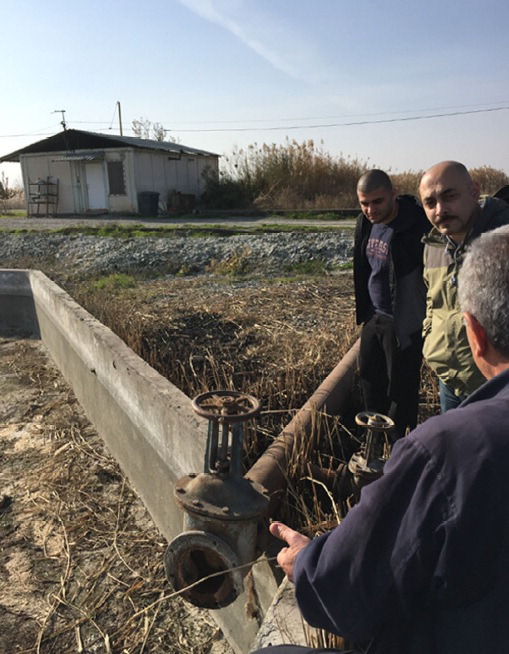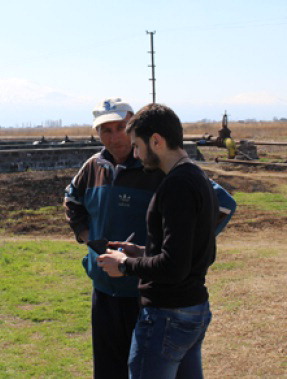|
Cycle 4 (2015 Deadline)
Sustainable Fisheries for Enhanced Water Resources in Armenia (SFEWRA)
PI: Vardan Urutyan (vardan@icare.am), International Center for Agribusiness Research and Education (ICARE)
U.S. Partner: Stephen Schoenholtz, Virginia Water Resources Research Center
Project Dates: October 2015 - June 2019
Agribusiness Teaching Center on Facebook ICARE Webpage March 2021 Medium Article
Project Overview
This project addressed the issues of depleting artesian water resources in the Ararat Valley. An increasing numbers of fish farms in the valley have substantially decreased the level of artesian water in the area. Although profitable in current market conditions, these fish farms operate primarily using inefficient water technologies. The first step in the project was to analyze targeted fish farms in the Ararat Valley to determine the current production models being used and recommend appropriate best practices for water-efficient aquaculture. The researchers also studied the potential for improving discharge water distribution efficiency and discharge water quality for targeted fish farms to agricultural plots in the Ararat Valley. After analyzing the current regulatory framework, the team produced recommendations for improved policy for water usage in fish farm production systems and for better management of discharge water. Throughout the process, they engaged key stakeholders to ensure their input was included in the study and to inform them of recommended policies and actions.  |  | | The project team made a series of field measurements and observations at the beginning of the project (photos courtesy of Dr. Urutyan). |
Final Summary of Project Activities
This project, which began in October 2015 and received a PEER Evidence to Action supplement in August 2017, was concluded as of June 30, 2019. However, the recipient organization used its own funds to organize an official opening event on October 7 at the fish farm that benefited from a new semi-closed Recirculation Aquaculture System, installed thanks to PEER. USAID Armenia Mission Director Deborah Grieser, Armenian government officials, representatives from the education sector, members of international and local organizations, and the project beneficiaries were present. During the opening event, SFEWRA project manager Lusine Tadevosyan described how the upgraded system works and how water is reused several times. The new system not only conserves water but also ensures that the water ultimately released is cleaner than that coming from conventional systems.
The main development impacts of the project center around its contribution to sustainable water use practices by Ararat Valley fish farms through the introduction of water-efficient farming models, such as closed or semi-closed recirculation systems, which ensure the restriction of water exchange and increase in stocking density. The project was also notable for its success in building partnerships within the sector through networking with several stakeholders, such as NGOs, government institutions, and two relevant projects directly funded by USAID—Participatory Utilization and Resource Efficiency of Water (PURE-Water) and Advanced Science and Partnerships for Integrated Resource Development (ASPIRED).
The following specific results were achieved during implementation of the project:
• Fifteen water-efficient and environmentally friendly business and operations models were developed for the fifteen beneficiary fish farms involved in the project. The proposed models include a technical description of water-efficient fish farm models, including description of the Recirculating Aquaculture System (RAS) model; Nitrogen management in RAS; calculation of Ammonia, Nitrate, and Nitrite optimal levels in the proposed system; proposed volume of water supply; the number of stocks to be kept under the model; necessary financial investments and cost-benefit analysis, etc.
• Thanks to the PEER Evidence to Action supplement, one beneficiary fish farm was upgraded from its existing production model into the intensive, water-efficient model. As a result, the fish farm uses 10 l/s groundwater (instead of 30 l/s water, as 20 L/s water is cleaned in mechanical and biofiltration units and recirculated back into the system). It now produces approximately 10 tons of fish annually. As a result of the upgrade, the fish farm re-uses the water four times over, increasing water efficiency greatly. In addition, the aquaponics system installed on the farm allows the farmer to generate additional revenue by producing and selling greens.
• Project team members participated in eight international and local conferences to present their research papers and results and made one study visit to the United States.
• Five manuscripts were developed, of which one was published in Groundwater for Sustainable Development, two in the Bulletin of Armenian National Agrarian University, one (in Armenian) in the Bulletin of National University of Architecture and Construction of Armenia, and one submitted and pending publication at the journal Aquaculture.
• Four public outreach and dissemination events were organized.
• Recommendations were developed and presented to the Ministry of Economy (Agriculture Department), and several technical presentations were made to the Ministry of Agriculture, USAID Mission, PURE-Water project staff, and other stakeholders.
Publication
Natella Mirzoyan, Narek Avetisyan, Hovhannes Mnatsakanyan, and Lusine Tadevosyan. 2018. Groundwater use and efficiency in small- and medium-sized aquaculture farms in Ararat Valley, Armenia. Groundwater for Sustainable Development 6: 1-5. https://doi.org/10.1016/j.gsd.2017.09.001
Links to Media Coverage
https://icare.am/archives/news/sfewra-disseminates-best-practices-of-efficient-water-use
https://youtu.be/_tBJnL6H6AU
https://hetq.am/hy/article/102068
https://icare.am/2019/10/15/recirculating-aquaculture-system-to-mark-a-new-era-in-armenias-fish-farming/
Back to PEER Cycle 4 Grant Recipients
| 




